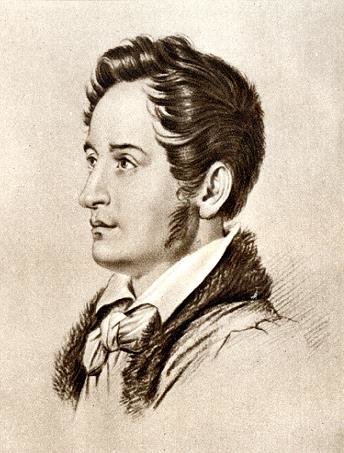Герцен Александр Иванович (25 марта (6 апреля) 1812 – 9 (21) января 1870). Писатель, политический деятель, философ.Внебрачный сын богатого помещика Ивана Алексеевича Яковлева и немки Луизы Ивановны Гааг. При рождении отец дал ребенку фамилию Герцен (от немецкого слова herz – сердце).
Получил хорошее домашнее образование. С юности отличался начитанностью, свободой и широтой взглядов. Декабрьские события 1825 года оказали большое влияние на мировоззрение Герцена. Вскоре он познакомился со своим дальним родственником по отцу Николаем Платоновичем Огаревым и стал его близким другом. В 1828 году они, будучи единомышленниками и близкими друзьями, на Воробьевых горах в Москве дали клятву в вечной дружбе и выказали решимость посвятить всю свою жизнь в борьбе за свободу и справедливость.
Герцен получил образование в Московском университете, где сошелся с рядом прогрессивно мыслящих студентов, образовавших кружок, в котором обсуждался широкий круг вопросов, касающихся науки, литературы, философии и политики. Окончив в 1833 году университет со степенью кандидата наук и серебряной медалью, он увлекся учением сенсимонистов и начал изучать произведения социалистических писателей Запада.
Через год А.И. Герцен, Н.П. Огарев и другие их соратники были арестованы за свободомыслие. Пробыв в тюрьме несколько месяцев, Герцен был сослан в Пермь, а затем в Вятку в канцелярию местного губернатора, где стал сотрудником газеты «Губернские ведомости». Там он сблизился со ссыльным архитектором А.И. Витбергом. Затем Герцен был переведен во Владимир. Какое-то время ему было разрешено жить в Петербурге, но вскоре он опять был сослан, на этот раз в Новгород.
В 1842 году Герцен получил разрешение на переезд в Москву, где прожил до 1847 года, занимаясь литературной деятельностью. В Москве Герцен написал роман «Кто виноват?» и ряд рассказов и статей касающихся социальных и философских проблем.
В 1847 году Александр Иванович уехал в Европу, живя попеременно то во Франции, то в Италии, то в Швейцарии и работая в различных газетах. Разочаровавшись в революционном движении Европы, он искал отличный от западного путь развития России.
После смерти жены в Ницце А.И. Герцен переехал в Лондон, где организовал издание свободной русской прессы: «Полярной звезды» и «Колокола». Выступая со свободолюбивой и антикрепостнической программой для России Герценовский «Колокол» привлек внимание и симпатии прогрессивной части русского общества. Он выходил до 1867 года и был весьма популярен среди русской интеллигенции.
Alexander Ivanovich Herzen. (March 25 (April 6), 1812 - January 9 (21), 1870). Writer, politician and philosopher.
The illegitimate son of a wealthy landowner Ivan Yakovlev and German Louise Ivanovna Hague. At birth, the father gave the child the name of Herzen (from the German word herz - heart).
Received a good education at home. From his youth differed by his erudition, freedom and open-mindedness. December events in 1825 had a major impact on the Herzen’s outlook. Soon he met his distant cousin on his father Nikolai Platonovich Ogare'v and became his close friend. In 1828, they, being minded and close friends on the Sparrow Hills in Moscow took an oath of eternal friendship and made known determination to devote their entire lives in the struggle for freedom and justice.
Herzen was educated at Moscow University, where he became friends with a number of progressive-minded students formed a circle, in which they discussed a wide range of issues concerning science, literature, philosophy and politics. After graduating from university in 1833 with a degree in science and a silver medal, he became interested in the teachings of sensimonists and began to study the works of socialist writers of the West.
A year later, AI Herzen, NP Ogarev and their other associates were arrested for freethinking. After spending a few months in jail, Herzen was exiled to Perm, Vyatka and then to the office of the local governor, where he became an employee of the newspaper "Provincial Gazette". There he became friends with the exiled architect AI Vitberg. Then Herzen was transferred to Vladimir. For a time he was allowed to live in St. Petersburg, but soon he was exiled again, this time in Novgorod.
From 1838 married his distant cousin Natalia Zakharina. Parents do not want to give Natalia for disgraced Herzen, then he stole his bride, married her in Vladimir, where he was exiled, and gave parents a fait accompli. All contemporaries noted the extraordinary affection and love of the spouses Herzen. Alexander often returned in his works to the image of Natalia Alexandrovna. In marriage had three children: son Alexander - professor of physiology; daughters Olga and Natalia. The last years of his life together spouses were marred by a sad passion Nataly German Georg Herwegh. This ugly, make them suffer all the participants, the story ended with the death of Natalia Alexandrovna childbirth. Illegitimate child died with her mother.
In 1842 Herzen received permission to move to Moscow, where he lived until 1847, engaged in literary activities. In Moscow, Herzen wrote the novel "Who is guilty?" And a number of short stories and articles related to social and philosophical problems.
In 1847, Alexander went to Europe, living alternately in France, in Italy, in Switzerland and working in various newspapers. Disappointed in the revolutionary movement in Europe, he was looking different from the Western way of development of Russia.
After his wife died in Nice AI Herzen moved to London, where he organized the publication of free Russian press: "North Star" and "The Bells." Speaking from the freedom-loving and serfdom program for Russian Herzen "Bell" attracted the attention and sympathy of the progressive part of Russian society. He went up to 1867 and was very popular among the Russian intelligentsia.
Herzen died in Paris and was buried in Pere Lachaise cemetery, then his remains were transported to Nice.












.jpg&w=1920&q=75)

.jpg&w=1920&q=75)













